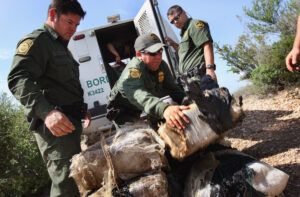The statement below was presented by WOLA, México Unido Contra la Delincuencia (MUCD), and other civil society organizations at the 61st Regular Session of the Inter-American Drug Abuse Control Commission (CICAD), which took place from April 24-26, 2017 in Washington, D.C.
In recent years, drug policy in the Americas has experienced a theoretical, practical, and even regulatory evolution that demands a profound rethinking of the metrics that governments use to measure the progress made. As part of this evolution, the region has moved beyond the traditional focuses on controlling supply, reducing demand, and fostering international cooperation to incorporate into their mandates other issues such as reducing violence and criminal activity, combating corruption, attaining the Sustainable Development Goals (SDGs), and effectively including public health, human rights and gender perspectives. However, beyond the discourse, the development of new metrics is making slow progress and today we continue “evaluating” drug policies with inadequate and misconceived indicators that, in the best of cases, measure processes or inputs and outputs without necessarily accounting for the effectiveness of efforts or their impacts – wanted and unwanted – on individuals and communities.
With the objective of contributing to this debate, the civil society organizations present at this dialogue shared both general recommendations and specific projects in which diverse actors are building new indicators that can help advance processes of reflection within CICAD and among Member States. In this regard, they highlighted projects being carried out by the Conflict Prevention and Peace Forum of the Social Sciences Research Council and the International Peace Institute in the United States; the International Center for Science in Drug Policy in Canada; the WOLA Central America Aid Monitoring Project; the Center for Research and Teaching in Economics (Centro de Investigación y Docencia Económicas, CIDE) in Mexico; and the Igarapé Institute in Brazil, among others. In addition, they pointed to projects developed outside the Americas by academic institutions such as Swansea University in Wales and the European Monitoring Centre for Drugs and Drug Addiction in Lisbon, which will soon publish a report based on a scenarios exercise which weighed indicators in different drug policy options.
In particular, civil society used the dialogue on Drug Policy Indicators: Measuring Progress with a Focus on Individuals to address key issues for determining the success or failure of current policies, such as the use of the criminal justice apparatus to prosecute drug offenses, criminal investigations into and the sanctioning of organized crime, and the attention given to communities in situations of socio-economic vulnerability. In this regard, speakers pointed out that governments often end up “achieving the metrics but falling short of the goals” when they use isolated indicators that are never put into context. For example, the indicator on the number of people incarcerated for drug offenses is inadequate and even deceptive for measuring the effectiveness of drug control efforts since, taken on its own, it says nothing about the impact on levels of consumption or the levels of violence used to achieve it. The same is true for indicators on organized crime that continue to omit the cooptation of state institutions and political actors’ active participation in drug-related illicit offenses, despite the fact that the sanctioning of these acts must be a fundamental determinant of drug policy success or failure.
A personal testimony from one of the speakers highlighted the individual and social impact of interacting with criminal justice and treatment institutions that have misaligned objectives and evaluation criteria. This underscores the need to rethink this alignment, with the aim of improving the quality of life, health, and social reinsertion of people with problematic drug use. It is also important to highlight the significance of participation by an organization of drug users, who may have been represented for the first time at CICAD.
In addition, participants in the dialogue also addressed the cross-cutting issues of gender, public health, and development, emphasizing the following:
1) With regard to gender, the importance of a holistic approach was underscored, which includes prevention and treatment of drug use; pregnant women; and women in conflict with the law. Improved information systems are urgently needed to allow for a better understanding of the specific problems and needs of women and girls, as well as their access to treatment services and alternatives to incarceration. It is also essential that women affected by drug policies be included in the design, implementation, monitoring, and evaluation of such policies.
2) In terms of drugs and the SDGs, the indicators being used today do not take into account the unwanted consequences of current drug policies. In addition, participants recognized the existing interdependency between drug policy and development agendas and expressed the need to redefine drug policy indicators that, analyzed in light of the 2030 Agenda’s comprehensiveness, can undermine or fail to strengthen governments’ development objectives. The year 2019 is key, since the UN agenda includes both a summit of heads of state for evaluating achievements with regard to the SDGs, as well as a high-level meeting for reviewing the UN’s 2009 Political Declaration and Action Plan on drugs.
3) With regard to indicators on drug policies and public health, emphasis was placed on the need to strengthen the range of interventions, recognizing the usefulness of harm reduction to improve countries’ performance on indicators such as the prevalence of HIV/AIDS and other communicable diseases and the full exercise of the right to health.
In conclusion, we thank the government of The Bahamas and the CICAD Secretariat for facilitating the dialogue with civil society on Drug Policy Indicators: Measuring Progress with a Focus on Individuals, which was held during CICAD’s 61st session. In recent years, we have established important spaces for collaboration that have allowed us to develop fruitful exchanges of ideas. However, it is still necessary to institutionalize formal mechanisms of participation, enabling the inclusion of civil society voices in the various spaces for discussion within CICAD.
We have several ideas about how to move forward on this task and we propose an initial exchange with the governments of The Bahamas and Mexico, which currently hold CICAD’s presidency and vice presidency, respectively, with the aim of developing proposals to achieve this objective.
Finally, we want to reaffirm our commitment to working together on the task of developing formal mechanisms of civil society participation within CICAD for the purpose of achieving our shared objective: To develop drug policies based on public health and human rights, taking into account a gender perspective, so our results will be more humane and more effective.
| Gender | Due Process and Proportionality | Human Rights | Organized Crime and Corruption |
| Use of drugs according to socio-demographic traits and type of substance | Number of homicides for every 100,000 inhabitants (disaggregated by socio-demographic traits) | Application of human rights standards to people deprived of their liberty | Number and type of white-collar crimes, their relationship to more serious offenses and the weakening of the State |
| Number of treatment services for women and girls (taking into account childcare responsibilities) | Effectiveness of criminal prosecution and proportion of criminal justice processes initiated for drug trafficking versus simple possession | Effective application of international human rights commitments | Ability to carry out effective investigations and prosecution of criminal networks and organized crime; Judicial cases against organized crime; Paradigmatic cases; Reduction of criminality due to effective investigation |
| Security of physical spaces for women | Number of sentences in which basic information was considered, such as drug dependency, age, gender, social traits, context in which the offense was committed | Lethality of force used by public security forces in the enforcement of drug laws | Effectiveness of mechanisms for access to information, transparency and accountability |
| Access to gynecological and obstetrical services and legal assistance | Percentage of cases with diligent investigation, chain of custody not adversely affected, application of procedural guarantees and proportional sentences | Percentage of people with health/legal problems related to drug use who access social services | Participation of civil society in processes of social assessment |
| Number of alternatives to incarceration available to women accused of drug offenses | Evaluation of the training of public servants |
To download the documents presented at the dialogue with civil society, visit:
http://www.cicad.oas.org/Main/AboutCICAD/Activities_ENG.asp?IE=US00D9




